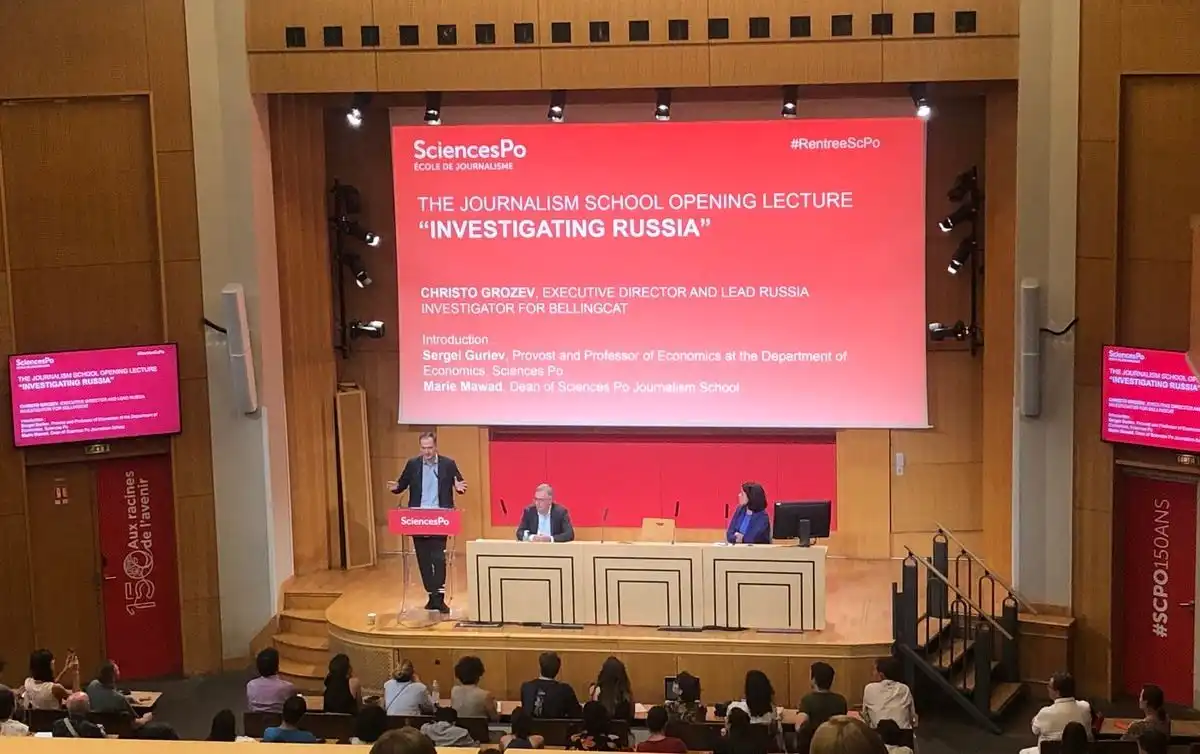Home>Christo Grozev: "Have the courage to write your own ethical rules"
09.09.2022
Christo Grozev: "Have the courage to write your own ethical rules"

"Today, you will see why journalism is important": with these words, in front of a packed Émile Boutmy amphitheatre, Sciences Po Provost Sergei Guriev introduced the inaugural lecture of the Journalism School on Monday 5 September. The guest of honour was Christo Grozev, Executive Director and Russia Lead Investigator at Bellingcat, an international group of researchers, journalists and citizens using open-source intelligence methods to conduct investigations with global impact.
Among other things, Christo Grozev and his team have identified the poisoners of Russian opposition leader Alexei Navalny and of double agent Sergei Skripal in the UK, and identified Russian officers involved in the downing of flight MH17 in Ukraine in 2014. More recently, the Bellingcat team has undertaken the crucial task of debunking misinformation about the war in Ukraine and building a database to document war crimes. As a Russian exiled in Paris, "I can tell you that in authoritarian regimes, investigations like this are a game changer: Christo Grozev has transformed the image of Russia and Putin's regime", said Sergei Guriev in his introduction.
In front of a captive audience, the Executive Director of Bellingcat spoke briefly about his extraordinary career. After 20 years working in commercial radio, he created a blog on misinformation. "I was observing a phenomenon that the rest of the world didn't really notice: how the Russian media was creating an environment for an uprising in Ukraine," he says.
He joined Bellingcat in 2015, just a year after its launch. The organisation specialised in uncovering crimes and human rights violations committed by governments. "We saw a glaring hole in international law", explains Christo Grozev: "it assumes that governments are not bad actors. So many crimes were falling through the cracks because nobody could or would investigate them."
Competences, crowdsourcing and courage
Eight years later, the small Bellingcat team has become "the Kremlin's worst nightmare", says Christo Grozev. The recipe for this success lies in three "Cs": competence building, crowdsourcing, and courage.
Bellingcat conducts each of its investigations as a piece of a larger puzzle: each discovery allows them to build competences and to improve their understanding of the context and motivations of the regimes. "So far, we have had 46 Russian investigations, and all of them are linked," explains Christo Grozev: "There are about 50 FSB agents that I know better than their own wives!”
One of the team's most crucial findings: the Russian intelligence services make mistakes all the time! "Knowing that they are not very smart was probably the biggest motivation to keep going," the investigator jokes.
Watch the replay
“Write your own rules”
Bellingcat's second advantage, according to Christo Grozev, lies in its ability to crowdsource and collaborate with other media, journalists, volunteers and specialists. "We are a non-profit organisation, our aim is to reveal the truth at all costs - not to scoop others," he explains.
In the Skripal poisoning case, for example, other media investigations were able to add to Bellingcat's revelations. And in Alexei Navalny's poisoning, the community of about 100 volunteers - image analysts, engineers, etc. - provided numerous hypotheses that led to the identification of six FSB agents.
Crucially, finally, it takes courage - and not just the courage to become the enemy of the State: "I'm talking more about the courage to write your own ethical rules of journalism," Christo Grozev stresses: "the rules have to change when you are dealing with bad actors, who remain in power indefinitely."
Bellingcat does things other media wouldn’t dare, such as buying data from the prolific black market in Russia. "But you need to be aware of the cost, including human cost, of doing this," he says: after each publication, the regimes fill in a hole in their defenses and step up their repression.
Impactful investigations in an ever more closed society
In the second part of the conference, Christo Grozev answered many questions from students and journalists. Many expressed their admiration for Bellingcat's work and its impact on the increasingly isolated and closed Russian society. When the investigation into Navalny's poisoning was published, "everything seemed possible again", said a Russian student, her voice heavy with emotion: "This optimism helped many Russians to survive."
In the face of Bellingcat's success, "is the age of state-owned secret service over?" asks one student. No, according to Christo Grozev: in some cases, Bellingcat's methods, focusing on small-scale data, have proved more effective than the bureaucracy of state agencies. But "I think we have shamed the intelligence services into getting their act together," he jokes.
Given the impact of their publications, are Bellingcat investigators ever in danger? For now, the attempts have been limited to intimidation, he replies: "We are definitely in the top 10 of Putin's personal hit list," he admits: "but we won't know until it happens." In the meantime, in an increasingly closed Russian society, the reach of Bellingcat's investigations is diminishing. But this closure only increases the importance of these revelations, argues Christo Grozev: "Now we are only reaching the last 30% of Russians who are actively seeking the truth," he says: "But they are the ones who will keep fighting."
Read more
Open house days 2026

Virtual Undergraduate Open House day 2026
Come meet our teams and students at our campuses.
Virtual Graduate Open House day 2026
Meet faculty members, students and representatives and learn more about our 30 Master's programmes.